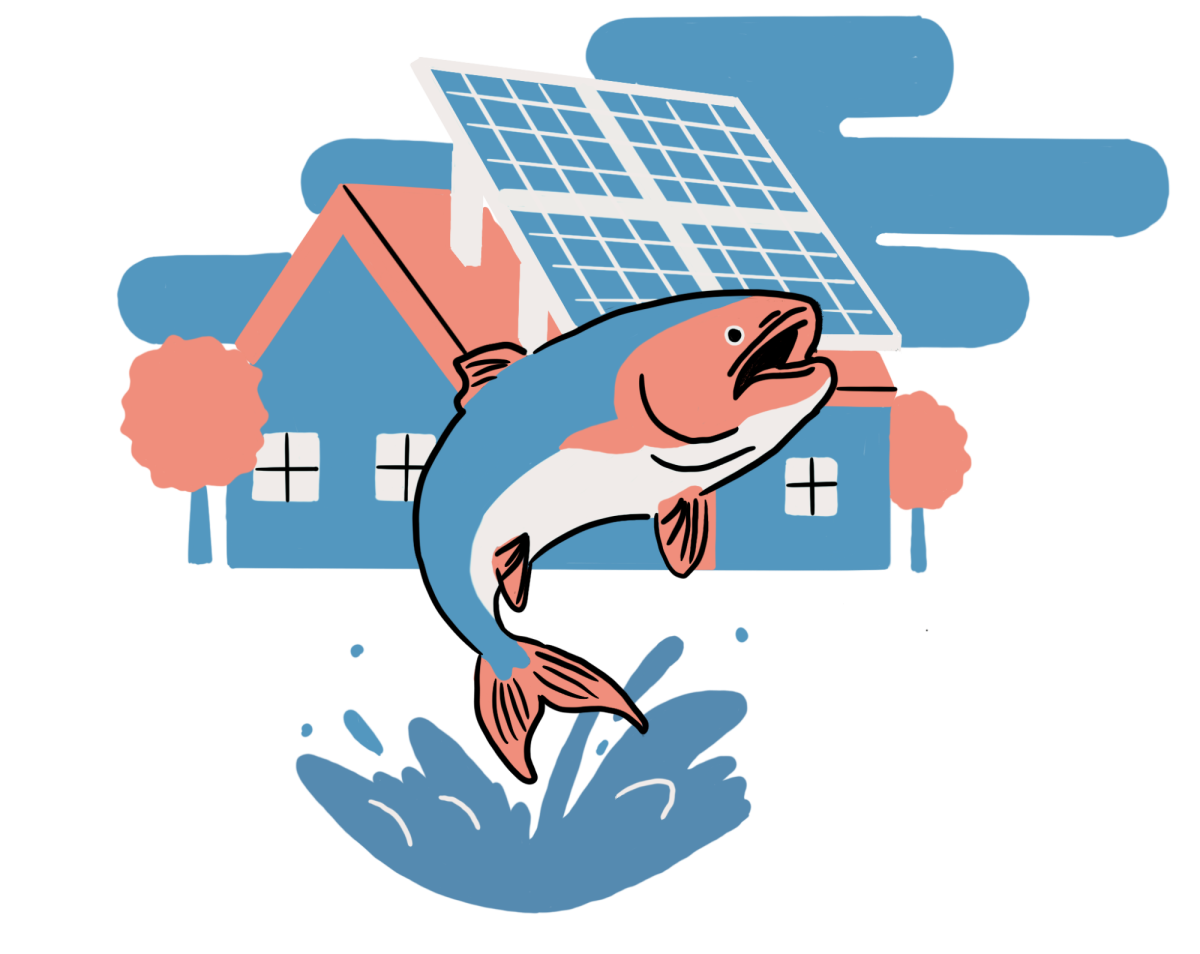
Editor’s note: This article has been updated to reflect Patagonia’s current relationship with the U.S. military and Lost Arrow’s separation.
On Sept. 14, 2022, Patagonia publicly declared that “Earth is now our only shareholder.” The founder of Patagonia, Yvon Chouinard, relinquished ownership of his billion-dollar company to two different entities. All voting stock was transferred to the Patagonia Purpose Trust, and all the nonvoting stock (worth roughly $3 billion) was transferred to the Holdfast Collective.
The Holdfast Collective is a specific kind of organization that can make unlimited political donations, under the distinction that the organization is not organized for profit, and is operating exclusively to promote social welfare. The Holdfast Collective has further specified their mission, that of combating climate change. All money not reinvested into the maintenance of the clothing company at the end of the year will be distributed among these entities to serve various environmental causes.
Associate Professor in Management at the John Molson School of Business, holder of the Concordia University Research Chair in Resilience and Institutions, and co-author of the Harvard Business Review article, “What Happens When a Company (Like Patagonia) Transfers Ownership to a Nonprofit?”, Dr. Joel Bothello explained the distinctions between voting and nonvoting stock.
“Voting stock is called ‘common stock’ and lets a holder vote on major corporate governance issues of the company. Non-voting stock is called ‘preferred stock’ and does not allow a holder to vote – it does, however, give them a higher claim on the equity of the firm [and oftentimes better dividends],” said Bothello.
This higher claim of equity would thus go toward the Holdfast Collective, supplying them with long-term funds for their specifically environmentally-focused philanthropic mission. This transition appears as an optimistic shift in the landscape of corporations today, especially in the face of looming capitalistic powers, all mostly focused on short-term profit maximization. Some theories about what “green” economies and practices tend to follow a trend of long-term rather than short-term maximization.
On Whitman campus, where Patagonia is both a stereotype and a cult classic, knowledge and discussion of what this transition actually entails is scarce. Despite this, the social significance of Patagonia persists in students.
Henry Anderson, a first-year student and consistent Patagonia customer speaks on the clothing as a symbol on campus.
“Obviously, the clothing is expensive. It’s making an investment when you buy something from them and so when people wear it, it’s kind of saying ‘I belong in the outdoors’. I have some amount of money, and I probably align with the values of sustainability or environmentalism. By wearing it, you’re agreeing with that,” Anderson said.
The values that customers are theoretically aligning with are one’s structures around sustainability and intentional consumption. Part of the reason why their clothing is notoriously expensive is because the company takes seriously sourcing sustainable materials seriously and producing those materials responsibly. This philosophy of production exists in the long term, viewing sustainability as the center of their economic process.
Assistant Professor of Economics Rosie Mueller’s area of focus includes environmental economics. She discussed what a sustainable economy would look like.
“I think when thinking about the actual definition of sustainability, you want to have something that will last, right? Even from economics of natural resources, if you have a stock of a resource, you should think about the long-term viability of that resource and you shouldn’t extract it all today for short-term profit. You should think about making that resource last as long as possible. So, conserving today for future use,” said Mueller.
Patagonia’s look towards long-term sustainable change seems like a breath of fresh air. It seems out of place for corporations to relinquish control to shareholder foundations. Many of our current economic practices—both in the United States and globally—are centered around capitalism, which emphasizes short-term gains, for maximum profit, at a minimum cost among other exploitative factors. The funneling of proceeds into shareholder foundations and trusts runs directly counter to this system, prioritizing charitable action over profit.
Professor Mueller spoke on why our economic system does not take into account natural resources or environmental protection.
“Our main measure of economic growth and economic well-being, GDP, gross domestic product does not include any measure of environmental resources or what we could call natural capital. And so there’s a lot of environmental economists that have to come up with measures to try to account for things like depletion of natural resources as [a] part of GDP, [like] the more oil you extract and sell, that is just good in terms of GDP, just like the more people that are treated in a hospital. More sick people might need more medical spending, where that is all going towards economic growth, it’s not necessarily the same as high social welfare in an economy,” said Mueller.
The system we operate under measures success and economic health through GDP, even at the expense of things like social, environmental, and cultural health. So why would Patagonia do this? In Dr. Bothello’s article, it is explained that foundation-owned firms like Patagonia function in the long term, making them more stable in growth and during crisis, and generally have longer lifespans.
Bothello spoke on the key distinctions in success between traditional and shareholder foundation-controlled companies.
“Typical shareholders are more interested in return on their investment than the long-term health of the companies they own. The main goal of a foundation, on the other hand, is to serve a philanthropic cause (and the profit they receive from the firm is how they do it),” said Bothello.
Bothello explained that if the company goes under, the foundation loses its only source of funding for its charitable causes. This structure makes thinking sustainably and long-term necessary. Prioritizing philanthropy can be very lucrative for large corporations, contrary to the structuring of the U.S. and some other world economic systems. There was, however, a possible contradiction for the future of Patagonia and the Holdfast Collective.
Patagonia was a contractor of the U.S. military for almost 40 years through the Department of Defense, providing various garments through its tactical apparel subsidiary, Lost Arrow. Lost Arrow has not been part of Patagonia for nearly two years, two years in which no official recognition of its former contracts with the military has come from Patagonia. This is, in theory, even more notable post-transition to the Holdfast Collective. The U.S. military is a significant contributor to emissions and environmental degradation. According to two 2019 reports, the U.S. military was the single largest institutional consumer of hydrocarbons. Another report found that if the U.S. military was a designated nation state it would be the 47th largest emitter of greenhouse gasses in the world. These, among other environmental and humanitarian injustices that have been carried out by the U.S. military and the Department of Defense, seem to run directly counter to Patagonia’s existing and continuing mission. This comes despite the company’s other dedication to transparency with their material sourcing, manufacturing, and company activism. Even on Whitman College campus, a place with proportionally much more anti-military, climate-conscious students, the topic of Patagonia’s former military contracts rarely rises to the top, if at all.
Anderson spoke on the possible contradictions with Patagonia’s previous engagement with the U.S. Military.
“Their values aren’t specifically liberal, although we associate environmentalism with that. I would say, a large portion of their demographic and who they’re targeting is people who believe in those values. And a lot of the times those people don’t agree with the spending on the US military and how it’s chosen to be used…But their mission is environmental action and climate work and sustainability, and I think that can be separate from supporting the US military. Although I don’t really support that, it wouldn’t make me stop buying from them,” Anderson said.
The individual consumer reckoning with the brand’s involvement in the military is one thing, but the philanthropic mission statement of the Holdfast Collective directs the money coming from Patagonia toward combating climate change. It does seem contradictory for that mission to subsist next to an unrecognized long-standing relationship with the Department of Defense, even if it no longer exists.
Bothello highlighted some of the possible previous environmental benefits of Patagonia’s military contracts.
“If Patagonia is making cold weather and combat uniforms that are more sustainable/durable than competitors’ clothing, one could argue that they are helping the military reduce their environmental harm. You could make the case that they should avoid the military completely out of principle, but this opens the door for the military to use less sustainable options (that will end up causing more waste). I don’t know what the answer is about whether this aligns with the values of the company, but I’m not sure it contradicts it either,” Bothello said.
These contradictions must be held next to their recent financial involvement in politics, with the Holdfast Collective donating $100,000 each to the Senate Majority PAC and House Majority PAC, organizations that work exclusively to elect Democrats into the U.S. House of Representatives. Patagonia is unafraid to become political, yet hesitant to turn their divestiture from Lost Arrow toward their advantage. An official recognition of former involvement could be an avenue for environmental activism that the Holdfast Collective can use.
The restructuring of these billions of dollars, and putting it exclusively towards climate action is undoubtedly an impressive and hopeful shift in the way large corporations and wealthy individuals think about their legacies and power.
However, if Earth truly was the only shareholder, other actions may be more impactful than just donations. The change in Patagonia’s ownership and control is thinking about sustainability for the long term. Yes, that is a good thing for the brand and business model, ensuring stability for years to come. But the climate crisis is not long-term, it’s happening now.
The Holdfast Collective has begun doing some good work with their funds, blocking mines in Alaska and conserving land in Argentina. But this is not enough. It is not enough to mop up the spill, we must stop the tap from flowing altogether.







